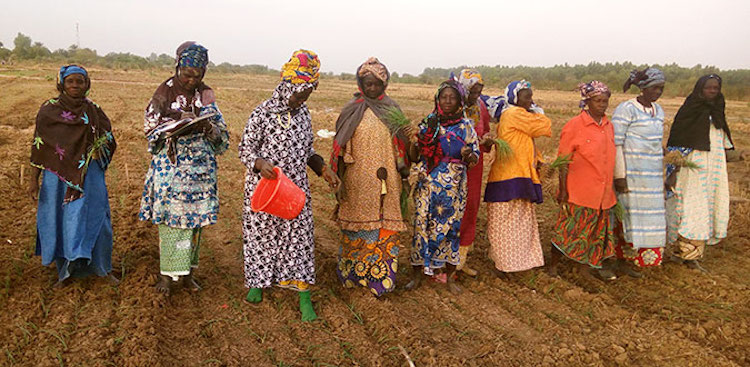By Ronald Joshua
NEW YORK | BAMAKO (IDN) – Fatou Dembele is a farmer in landlocked Mali, where half of the population engaged in agriculture are women. Agriculture is a key sector to lift women out of poverty. But the increasing degradation of land and natural resources caused by climate change is making women more vulnerable.
Therefore when Dembele’s plants first started dying, she thought the plot of land was ruined, and her livelihood was at risk. “We thought the land was sick. We didn’t know that there were live parasites that attacked the roots of the plants and could kill them,” says Dembele.FRENCH|INDONESIAN | ITALIAN | JAPANESE | PORTUGUESE | SPANISH | SWAHILI | TURKISH
The increased number of parasites, because of rising temperatures and humidity, is just one of the many side effects of climate change Dembele and other women farmers are faced with.
To combat the negative impact of climate change on women’s livelihoods, a new UN Women programme known as Agriculture Femmes et Développement Durable (AgriFed), implemented by the local non-governmental organization Groupe d’Animation Action au Sahel (GAAS) Mali, is helping local producers adapt to these new challenges.
The programme works with farmers to modernize their techniques, enables their access to information on latest advances in agriculture and increases the value of their products by improving their conservation methods.
“The effects of climate change are not sparing Mali, and are hitting this country hard, an additional challenge in an extremely fragile security context in the Sahel region,” Maxime Houinato, UN Women Country Representative in Mali, said at a side event co-organized by UN Women on March 14 at the 62nd session of the UN Commission on the Status of Women (CSW62).
“And yet, Mali, although a low contributor to the global emission of greenhouse gases, is no less committed to the race to adapt to the effects of climate change,” she added.
To restore Dembele’s production, the programme taught her how to use locally available biopesticides to eliminate the parasites. “Thank goodness, we learned that there are local plants whose extracts can fight this disease,” says Dembele.
AgriFed started its activities in 2017 in the Segou region, over 200 kilometres northeast of Bamako, the capital of Mali. Training on sustainable agriculture techniques reached 247 women and 66 men. The training helped farmers improve water usage, crop scheduling, pesticide and fertilizer use, and cultivation techniques.
In the towns of Boidié and Sécoro, and Cercle de Tominan, women have improved and increased production of shallots thanks to the training. But during harvest, it became clear that the women needed to learn how to conserve their produce better.
“We grow shallots and onions because of their long shelf-life, but we did not know conservation techniques [before],” explained Hayèrè Keita, a shallot producer and seller in Sécoro. “Following our traditional methods, the rates of loss can be very high.”
UN Women supported further training sessions that showed the farmers how to preserve products like shallots, onions and potatoes. Around 110 women producers have managed to increase their revenues using these modern production and preservation techniques.
“I have been growing vegetables and fruits for 20 years, but I only knew the traditional way of doing it,” says Alphonsine Dembele, another farmer.
“AgriFeD taught us to diversify the products we grow, with the introduction of the potatoes, tomatoes and peppers. They not only bring additional income, but also help improve nutrition at home and reduce malnourishment in our children. says Dembele, the other farmer.
She adds: “It has had a positive influence on social cohesion, because women [from different ethnic communities] now meet and have dialogues during the training sessions in the fields.”
The programme, funded by the Government of Luxembourg, will run for five years and is expected to be replicated in other areas of the country.
The programme was launched on December 12, 2017 with a view to building the resilience of a million women and youth in the Sahel to climate impacts through smart agriculture at the One Planet Summit. The launch coincided with a gathering of world leaders in the French capital to mark the anniversary of the landmark Paris Climate Change Agreement.
The One Planet Summit, co-hosted by the President of France, Emmanuel Macron, UN Secretary-General António Guterres, and the President of the World Bank, Jim Yong Kim, aimed at supporting the formal UN process on climate action as nations look to raise climate ambition in the run up to 2020.
The initiative is a programme of the United Nations Integrated Strategy for the Sahel (UNISS) and the G5 Secretariat. The G5 Sahel, the institutional framework for development coordination among the five countries in the region – Burkina Faso, Chad, Mali, Mauritania, and Niger – has identified combatting climate change and environmental degradation, along with their effects on rural populations, as a priority.
At the national level, governments are working on adaptation strategies; the new initiative is designed to support those efforts. UN Women presented the programme, which is among some 12 showcased at the Summit, on behalf of the UN system. [IDN-InDepthNews – 27 March 2018]
Photo: Members of the women’s cooperative use climate-resilient organic compost and biopesticides in their farm. Credit: UN Women


